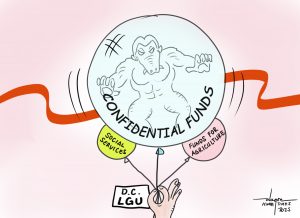 I remember in 2002, a friend who had then worked as a nurse in a New York City hospital was home for a visit. As the September 11 tragedy was still fresh on everyone’s mind, I had casually asked how she and some of our friends felt then dealt with the tragedy first-hand. They had been on duty since the night before, she recalled, and the sudden rush of activity at the hospital on that morning where she worked had jolted them out of what was already supposed to be a tone-down before their awaited off-duty hours.
I remember in 2002, a friend who had then worked as a nurse in a New York City hospital was home for a visit. As the September 11 tragedy was still fresh on everyone’s mind, I had casually asked how she and some of our friends felt then dealt with the tragedy first-hand. They had been on duty since the night before, she recalled, and the sudden rush of activity at the hospital on that morning where she worked had jolted them out of what was already supposed to be a tone-down before their awaited off-duty hours.
However, she said that in spite of all the blistering pace of events of that day and the next that they endured as was their calling, the thing that had stuck out the most in her mind had been the one-ness in spirit, or solidarity shown by the people of Gotham.
While they had been almost overrun at attending to the steady stream of patients coming in (mostly first responders in the hospital where she worked), what had given them added strength and energy was the overwhelming amount of support for each other, manifested in so many forms by all the people of New York. Unforgettable as that had been, I recall that she even had been teary-eyed while narrating it.
In a similar way, the same may be said of the dedication lent forth by our medical front liners when Covid-19 made landfall in early 2020. Even though 2020 may have been a much different era and in a different culture and country, small talks with some front-liners via both online and some casual restricted encounters, the spirit of dedication and service was still very much present despite the threat. One even said that ‘you train for this.’
More-telling added components exist however, and these are resentment and a feel of abandonment. While unspoken along the corridors, they nevertheless exist. At first, during the early days, some complaints had leaked out about patients not telling the truth when it came to the tracing methods done on them by medical personnel. As a result, some front-liners had become infected while others died. Despite pleas for a more truthful medical history, this had still been a regular occurrence even as attempts have been made to come up with a more accurate system of tracing.
In the city, it could be said that our whole pandemic experience may be likened to a roller coaster’s ups and down. While for the most part, our medical capabilities had held on through, it is now threatened as never before as holding areas are slowly filling up. In the general sense, it is not the virus, even with its more lethal version, the Delta Variant, that is the culprit. The city has proven that when we adhere to quarantine protocols, we could arrest it. The saddest thing is, although many still refuse to accept it, hiding behind the guises and alibis of government inefficiency and our right to earn in order to survive, it will still be our lack of discipline that will do us all in. This is the first-hand experience in the eyes of medical front-liners. Who could blame them to feel the way they do?


